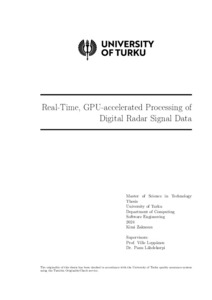Real-Time GPU-accelerated Processing of Digital Radar Signal Data
Zaknoun, Kimi (2024-06-28)
Real-Time GPU-accelerated Processing of Digital Radar Signal Data
Zaknoun, Kimi
(28.06.2024)
Julkaisu on tekijänoikeussäännösten alainen. Teosta voi lukea ja tulostaa henkilökohtaista käyttöä varten. Käyttö kaupallisiin tarkoituksiin on kielletty.
avoin
Julkaisun pysyvä osoite on:
https://urn.fi/URN:NBN:fi-fe2024062859742
https://urn.fi/URN:NBN:fi-fe2024062859742
Tiivistelmä
This thesis investigates the utilization of Graphics Processing Units (GPUs) for real-time processing of digital radar signal data. The motivation is to leverage the massive parallel computing capability of the GPU for computationally intensive
tasks involved in digital radar signal processing.
A real-time, GPU-accelerated radar signal processing solution is implemented on a heterogeneous platform by utilizing CUDA and various NVIDIA libraries. The solution is tested using high bitrate digitized wideband signal data. The solution’s
performance is then evaluated through a series of experiments focusing on key data processing stages.
The experimental evaluation demonstrates that the GPU significantly enhances data processing speeds in the preprocessing and FFT stages by achieving real-time performance for wideband radar signals. However, a bottleneck in the CPU-side postprocessing is also identified, indicating the need for further optimization or offloading it to the GPU. The findings suggest that while GPUs offer substantial improvements in radar signal processing, the specific task division between GPU and CPU requires careful consideration to fully exploit the potential of GPU acceleration.
This work seeks to contribute to the advancement of GPU-accelerated computing by highlighting the potential to take advantage of GPUs in real-time digital signal processing for radar applications.
tasks involved in digital radar signal processing.
A real-time, GPU-accelerated radar signal processing solution is implemented on a heterogeneous platform by utilizing CUDA and various NVIDIA libraries. The solution is tested using high bitrate digitized wideband signal data. The solution’s
performance is then evaluated through a series of experiments focusing on key data processing stages.
The experimental evaluation demonstrates that the GPU significantly enhances data processing speeds in the preprocessing and FFT stages by achieving real-time performance for wideband radar signals. However, a bottleneck in the CPU-side postprocessing is also identified, indicating the need for further optimization or offloading it to the GPU. The findings suggest that while GPUs offer substantial improvements in radar signal processing, the specific task division between GPU and CPU requires careful consideration to fully exploit the potential of GPU acceleration.
This work seeks to contribute to the advancement of GPU-accelerated computing by highlighting the potential to take advantage of GPUs in real-time digital signal processing for radar applications.
